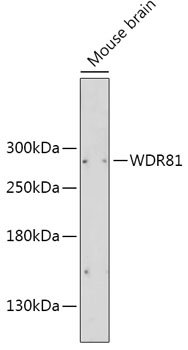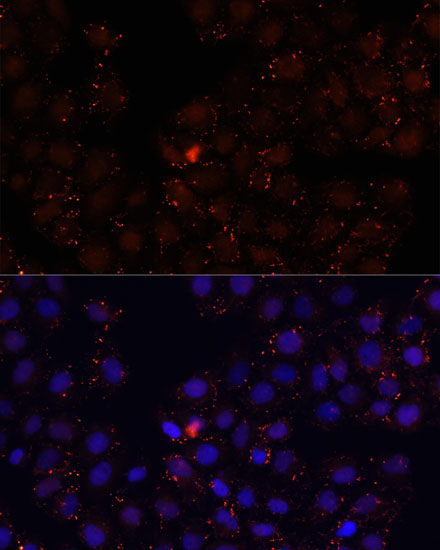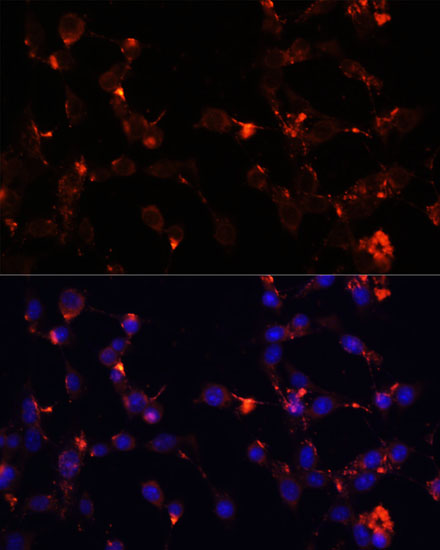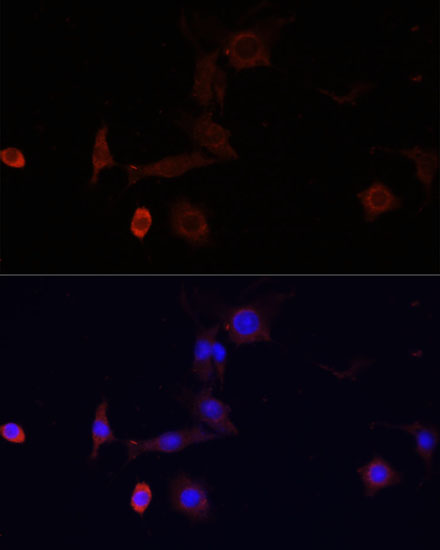-
Product Name
WDR81 Polyclonal Antibody
- Documents
-
Description
Polyclonal antibody to WDR81
-
Tested applications
WB, IF
-
Species reactivity
Human, Mouse, Rat
-
Alternative names
WDR81 antibody; CAMRQ2 antibody; PPP1R166 antibody; SORF-2 antibody; WD repeat domain 81 antibody
-
Isotype
Rabbit IgG
-
Preparation
Antigen: Recombinant fusion protein containing a sequence corresponding to amino acids 360-600 of human WDR81 (NP_689561.2).
-
Clonality
Polyclonal
-
Formulation
PBS with 0.02% sodium azide, 50% glycerol, pH7.3.
-
Storage instructions
Store at -20℃. Avoid freeze / thaw cycles.
-
Applications
WB 1:500 - 1:2000
IF 1:50 - 1:200 -
Validations

Western blot - WDR81 Polyclonal Antibody
Western blot analysis of extracts of Mouse brain, using WDR81 antibody at 1:2000 dilution.Secondary antibody: HRP Goat Anti-Rabbit IgG (H+L) at 1:10000 dilution.Lysates/proteins: 25ug per lane.Blocking buffer: 3% nonfat dry milk in TBST.Detection: ECL Basic Kit .Exposure time: 90s.

Immunofluorescence - WDR81 Polyclonal Antibody
Immunofluorescence analysis of HeLa cells using WDR81 antibody at dilution of 1:100. Blue: DAPI for nuclear staining.

Immunofluorescence - WDR81 Polyclonal Antibody
Immunofluorescence analysis of NIH/3T3 cells using WDR81 antibody at dilution of 1:100. Blue: DAPI for nuclear staining.

Immunofluorescence - WDR81 Polyclonal Antibody
Immunofluorescence analysis of PC12 cells using WDR81 antibody at dilution of 1:100. Blue: DAPI for nuclear staining.
-
Background
Functions as a negative regulator of the PI3 kinase/PI3K activity associated with endosomal membranes via BECN1, a core subunit of the PI3K complex. By modifying the phosphatidylinositol 3-phosphate/PtdInsP3 content of endosomal membranes may regulate endosome fusion, recycling, sorting and early to late endosome transport. It is for instance, required for the delivery of cargos like BST2/tetherin from early to late endosome and thereby participates indirectly to their degradation by the lysosome. May also play a role in aggrephagy, the macroautophagic degradation of ubiquitinated protein aggregates. In this process, may regulate the interaction of SQSTM1 with ubiquitinated proteins and also recruit MAP1LC3C. May also be involved in maintenance of normal mitochondrial structure and organization (By similarity).
Related Products / Services
Please note: All products are "FOR RESEARCH USE ONLY AND ARE NOT INTENDED FOR DIAGNOSTIC OR THERAPEUTIC USE"
